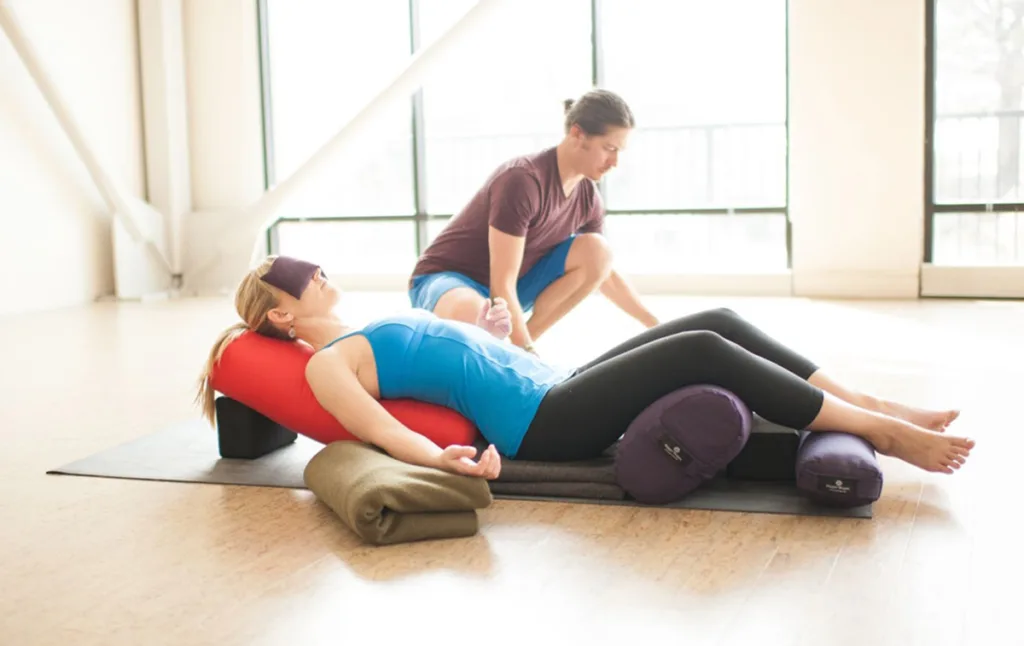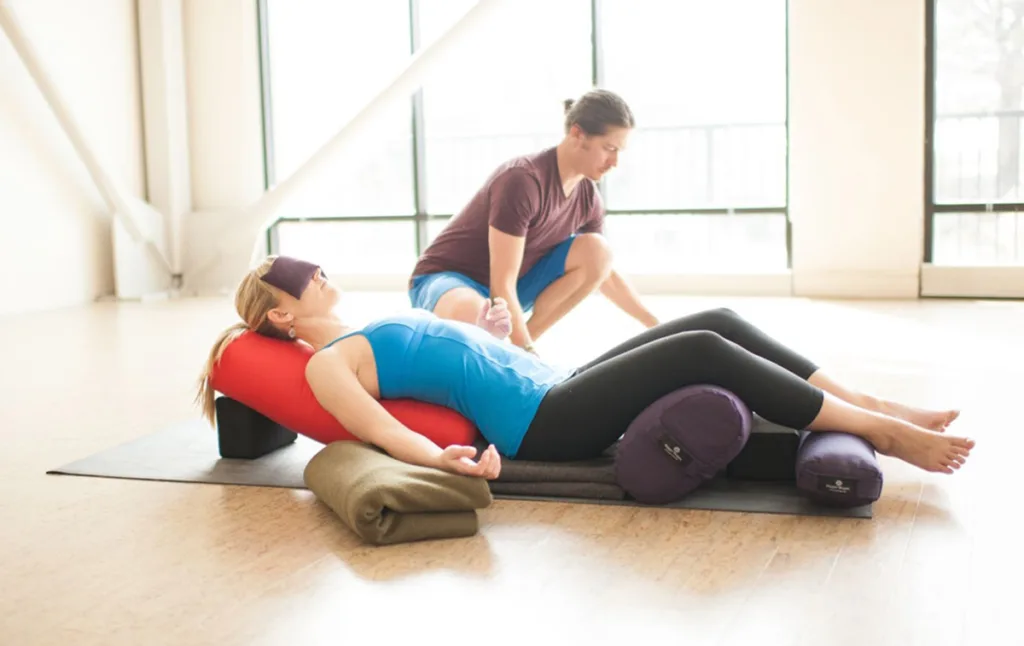In a world buzzing with constant chaos and demands, finding a moment of tranquility and balance is no small feat. Enter yoga, the ancient practice that seamlessly bridges the gap between mind and body, offering a sanctuary where harmony and self-care collide. Join us as we delves into the transformative power of nurturing mind and body through yoga, and discover the key to unlocking a healthier, more aligned self.

The Benefits of Yoga for Mental Health
Yoga is not only a physical practice but also a powerful tool for improving mental health. By incorporating yoga into your routine, you can reap numerous benefits for your mind and body.
One of the key benefits of yoga for mental health is its ability to reduce stress and anxiety. The deep breathing and mindfulness practices in yoga help calm the nervous system and promote a sense of relaxation. This can help lower cortisol levels and mitigate the effects of chronic stress on the body.
Additionally, practicing yoga regularly can enhance your mood and increase feelings of well-being. The combination of physical movement, breathwork, and meditation in yoga can release endorphins and boost serotonin levels, which are neurotransmitters that promote feelings of happiness and contentment.
Yoga can also improve your mental clarity and concentration. The focus on breath and body awareness in yoga can help quiet the mind and improve cognitive function. By regularly practicing yoga, you can cultivate a sense of inner peace and balance that can benefit your mental health in profound ways.
– Exploring the connection between yoga practice and improved emotional well-being
Yoga is a practice that goes beyond just physical exercise. It has the power to deeply impact our emotional well-being, nurturing both mind and body. Through a combination of breath work, movement, and meditation, yoga can help us connect with our emotions and cultivate a sense of inner peace.
One of the key benefits of yoga is its ability to reduce stress and anxiety. By focusing on the present moment and letting go of worries and distractions, yoga helps us to release tension and calm the mind. This can lead to improved mood, better sleep, and overall emotional stability.
Additionally, practicing yoga encourages self-reflection and self-awareness. Through poses that require concentration and balance, we learn to listen to our bodies and observe our thoughts without judgment. This mindfulness practice can help us manage our emotions more effectively and develop a greater sense of empathy and compassion towards ourselves and others.
– Tips for incorporating mindfulness techniques into your daily routine
Yoga is a wonderful way to incorporate mindfulness techniques into your daily routine. By practicing yoga regularly, you not only nurture your body but also your mind. Here are some tips to help you get started:
- Set aside time: Carve out a specific time each day to practice yoga. Whether it’s in the morning or before bed, consistency is key.
- Start with simple poses: If you’re new to yoga, begin with basic poses such as downward dog, child’s pose, and mountain pose. Focus on your breath and be present in the moment.
- Listen to your body: Pay attention to how your body feels during each pose. Don’t push yourself too hard and always modify as needed.
Remember, the goal of yoga is not perfection but rather self-awareness and self-care. Take the time to nurture both your mind and body through this ancient practice.
Physical Strength and Flexibility: Achieving Balance Through Yoga
Yoga is a transformative practice that goes beyond just physical movements. It is a holistic approach to health and wellness that nurtures both the mind and body. Through the practice of yoga, individuals can achieve a harmonious balance of physical strength and flexibility.
One of the key benefits of yoga is its ability to improve physical strength. By engaging in various yoga poses and sequences, individuals can strengthen their muscles, increase their endurance, and improve their overall fitness levels. Yoga also helps to improve posture and alignment, leading to a stronger and more resilient body.
Flexibility is another important component of yoga practice. Regular practice of yoga can help to increase flexibility in the muscles and joints, leading to improved range of motion and reduced risk of injury. Flexibility is essential for maintaining overall physical wellness and preventing stiffness and discomfort in the body.
– How yoga postures can increase strength, flexibility, and overall body awareness
Yoga is not just a physical exercise; it is a holistic practice that nurtures both the mind and body. Through a series of postures or asanas, yoga can help increase strength, flexibility, and overall body awareness. Here are some ways in which yoga postures can benefit your body:
- Strength: Yoga postures require you to engage various muscle groups, helping to build strength in a balanced and sustainable way. Poses like Plank, Warrior, and Downward Dog can target different muscle groups to increase overall strength.
- Flexibility: Stretching and holding yoga poses can help improve flexibility by lengthening muscles and increasing range of motion. Poses like Forward Fold, Pigeon, and Cobra can help target tight areas and improve flexibility over time.
- Body Awareness: Yoga encourages mindfulness and body awareness by focusing on breath and alignment in each pose. This can help improve posture, balance, and proprioception, allowing you to better understand and connect with your body.
– Recommendations for developing a regular yoga practice to enhance physical well-being
One key recommendation for developing a regular yoga practice is to start slowly and gradually increase the duration and intensity of your sessions. Begin with shorter sessions, maybe just 10-15 minutes a day, and slowly work your way up to longer practices as your strength and flexibility improve.
Another important tip is to find a style of yoga that resonates with you and fits your specific needs and goals. Whether it’s gentle Hatha yoga for relaxation, power Vinyasa for a challenging workout, or restorative yoga for healing and rejuvenation, there are endless options to explore. Experiment with different styles until you find the one that feels right for you.
Consistency is key when it comes to reaping the benefits of yoga. Set aside dedicated time each day for your practice, whether it’s in the morning to start your day off right or in the evening to wind down and relax. By committing to a regular practice, you will not only enhance your physical well-being but also cultivate mental clarity and emotional balance. Embrace the journey and enjoy the transformative power of yoga on both mind and body.
Cultivating a Sense of Inner Peace and Self-Awareness
Yoga is a powerful practice that goes beyond just physical exercise. By incorporating yoga into your daily routine, you can nurture your mind and body, . Through various yoga poses and breathing techniques, you can connect with your body on a deeper level, promoting relaxation and mindfulness.
With regular practice, yoga can help you release tension and stress, allowing you to let go of negative emotions and thoughts. This can lead to increased clarity of mind and a greater sense of self-awareness. By focusing on your breath and movement, you can quiet the chatter of the mind and tap into your inner wisdom and intuition.
Whether you’re a beginner or an experienced yogi, incorporating yoga into your daily routine can have numerous benefits for your overall well-being. By taking the time to nurture your mind and body through yoga, you can create a sense of balance and harmony in your life, leading to a greater sense of inner peace and self-awareness.
– The role of meditation and breathing techniques in promoting serenity and mindfulness
Meditation and breathing techniques play an essential role in promoting serenity and mindfulness. By incorporating these practices into our daily routine, we can nurture both our mind and body, leading to a greater sense of overall well-being.
Through the practice of yoga, we can cultivate a deeper connection between our physical and mental selves. Yoga encourages us to focus on our breath, allowing us to calm our minds and release tension from our bodies. By combining movement with breath, we can promote relaxation and mindfulness in a holistic way.
When we engage in meditation, we are able to quiet our minds and center ourselves in the present moment. This state of mindfulness helps us let go of stress and anxiety, allowing us to experience a greater sense of peace and clarity. By setting aside time each day for meditation, we can cultivate a sense of inner stillness that can benefit our overall mental health.
– Guided practices for fostering self-reflection and personal growth through yoga
Yoga is a powerful tool for self-reflection and personal growth, offering guided practices that help nurture both the mind and body. Through a combination of physical postures, breathing techniques, and meditation, individuals can embark on a journey of inner exploration and transformation.
By incorporating yoga into your daily routine, you can cultivate a deeper sense of self-awareness and mindfulness. Through mindful movement and breathwork, you can connect with your inner thoughts and emotions, facilitating self-reflection and self-discovery.
Yoga encourages individuals to embrace imperfection and practice self-compassion. By acknowledging and accepting your limitations on the mat, you can learn valuable lessons that translate into your everyday life, fostering personal growth and emotional resilience. Through consistent practice, you can cultivate a sense of balance, peace, and harmony within yourself.
As we wrap up our exploration of nurturing mind and body through yoga, we hope you feel inspired to incorporate this ancient practice into your daily routine. Whether you are seeking physical strength, mental clarity, or emotional balance, yoga offers a holistic approach to wellness that can benefit all aspects of your life. Remember to listen to your body, breathe deeply, and let go of any expectations as you embark on this transformative journey. May your practice bring you peace, growth, and a deeper connection to yourself. Namaste.

